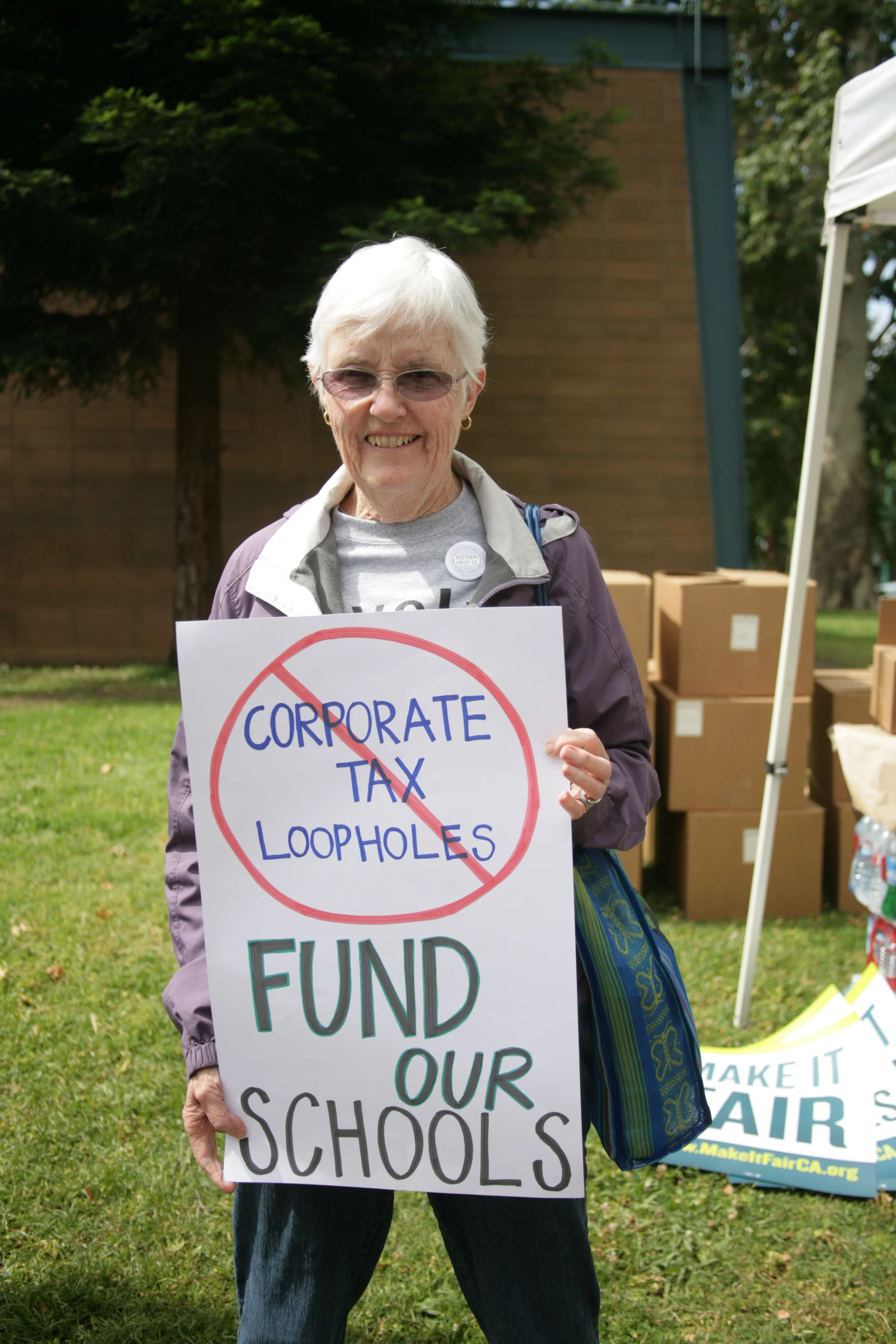After hearing her powerful public testimony at Assemblymember Phil Ting’s Prop. 13 hearing on July 10th, we reached out to University of San Francisco student and campaigner Veronica Ramirez to share with us what education means to her, and why we need to close the corporate loopholes which have devastated public spending for decades.
Q: Would you like to tell me a little about yourself; your family, what you are studying, and what you want to do with your degree?
Veronica: I grew up with my parents, older sister, and younger brother. Since I can remember, my parents have always told us that getting an education is essential and that we should use that knowledge to strive for our goals and dreams. I was studying psychology, but after I was involved in a campaign in San Francisco, I realized that I wanted to study politics. I want to change something about the world we live in and find a way to make it a better place.
Q: What was it like growing up with public education in California, could you describe your classroom experiences?
Veronica: At first, it was amazing. We had class discussions, group projects, field trips, recess, art time, music. Everything. I loved all of my teachers. We had about 20 students or less in each class, so they not only remembered my name, who my parents were and how I was doing in class, they knew my likes and dislikes, my passions, my strengths and weaknesses. They knew who I was and they cared. I knew that they really cared not only for my education, but for me, as a person.
Q: What is it like to study in an overcrowded classroom in school?
Veronica: In middle school I still had great teachers, and they knew me by name and how I functioned in class, some of what I liked and didn’t, but the care didn’t rub off the same. Then came high school. I had one class with over 50 students in it. My freshman and sophomore years I was miserable, I had my friends, but the teachers just knew me by school performance - what my grades were - they didn’t know me. I had to fight my last years to stand out from the crowd of dozens of students, and I was able to teach my teachers who I was, but it was an uphill battle. There were so many students that went through the system not feeling like any of their teachers gave a damn about them.
Q: How did you first hear about reforming Prop. 13?
Veronica: I heard about it when I started working with Working Partnerships USA. We were on the Make it Fair campaign, and after researching it, being trained and understanding how negatively commercial property tax loopholes were affecting the state, I realized, like thousands of other people, that we have to reform Prop. 13.
Q: Governor Brown recently announced that California has a budget surplus this year, and that the economy is recovering. Why do you think we need to reform Prop. 13 now if we have enough funding?
Veronica: The economy is recovering, yes, but how much? Can we really settle with having barely enough money to put into education? The budget is not enough, it has not been enough for years, and going slightly over the budget is definitely not enough. Those children in crowded classrooms, with limited school supplies, old textbooks, lack of sports, art, and theater; they do not have a surplus of funds. I did not have a surplus of funds at my schools. Parents constantly had to give money to a system that should be free, the children had to fundraise to help the schools programs. As I got older, the programs were cut down more and more, until some of them went away. And it’s a shame because that’s the school system my 10 year old brother is living in right now. There is a problem, the schools need money, and by reforming Prop. 13, money that is being kept within corporations will finally flow into the state.
Q: I know you’re involved with Working Partnerships; from your experiences there, what kind of impact have budget cuts had outside of the classroom?
Veronica: Going door-to-door in various neighborhoods, you hear stories. People telling me about parks being demolished and used for commercial buildings, not being able to put their kids into any sports because they don’t have the money, parents struggling to work and find childcare for their children because afterschool programs are almost nonexistent. Personally the one that hit me the hardest was when this woman mentioned the libraries being closed half the week, with very limited hours. My brother has to deal with this, and it hurts. It hurts that one of the tools that helped me develop a passion that has now brought me all the way to a 4 year University, is almost gone.
Q: What would you, or your friends who rely on financial aid, do if it was cut any further?
Veronica: Honestly, if financial aid was cut, none of my close friends would be able to go to school. They simply do not have the money. I mean, I’m barely making it; I had to borrow money from my uncle and sister and get a private loan just to pay off last year, apart from the fact that I was also working a full time job for a few months, had 2 federal loans, two scholarships and two grants. If financial aid was cut down any more than it already is, I would have to drop out of school too.
Q: As you know, decades of post-Prop. 13 budget cuts from Sacramento have decimated education funding in the state. Our campaign to reform Prop. 13 to make big corporations pay their fair share of property taxes will restore around $9 billion in education and public services funding. What do you think California should do with that revenue? What would a fully funded public education system mean to you?
Veronica: Libraries, schools, parks, fire-fighters, community programs, all of that needs funding now! We can’t keep waiting for more schools and libraries to shut down, for more tools to be taken away from the little citizens that matter most. It would mean that the same amount of money is spent on each child in the state, and that what is spent on them is enough to give them lectures, sports, art, theater, computers, books, everything that they need to become well-rounded. Children will become us, can we really place on a limit on how much should be spent on our future? We simply can’t. Thank you.






